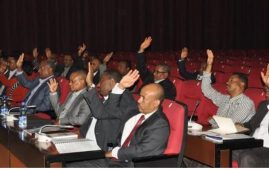In pre-1991 Ethiopia, it was unsurprising if a parent asks a nearby police station to give her/his child ‘a little whipping’. It was a ‘normal police service’, though it might require a ‘cooperative’ officer.
a ‘normal police service’, though it might require a ‘cooperative’ officer.
That is a history now. But little has changed for Ethiopia’s children since then.
All Ethiopian children experience corporal punishment, as a study of Save the Children Sweden indicates. Among 1,800 adult and 500 children respondents from five regions, ‘only 17 children (1.4%) stated that they had never experienced corporal punishment in any setting.‘
Another survey, published by the African Child Policy Forum, corroborates it. Of 485 young women respondents, 71% stated that they were beaten by an object in their childhood.
What’s no less dismaying is that, it is legal!
A license to abuse
The above-cited data are not new revelations, rather published in 2006 and 2005, respectively. In fact, the UN Committee on the Rights of the Child has been urging the government to reconsider the matter since 1995.
Ironically, the license to abuse children is provided by none but the very laws that were supposed to ensure the wel-being of children.
The Revised Family Code, issued by the Federal parliament in July/2000, states:
Article 258. – Up bringing of the Minor.
I) The guardian shall direct the up bringing of the minor.
2) The guardian may take the necessary disciplinary measures for the purpose of ensuring his up bringing.
Though an otherwise progressive law and a land-mark in Ethiopia women’s movement, it permits the abuse of a minor, a person under 18, in the disguise of ‘disciplinary measure’. And, the license is not confined to the biological parents of the child, rather to anyone who provides food and shelter to the child. Though children are expected to be raised by their biological parents, they often end up in the hands of others for a wide range of reasons, including the death or poverty of parents. Almost all Ethiopians saw a child forced to spend years with another family, with distant or no kinship, needing a residence proximate to school. Moreover, if the parents die, relatives of the child – ascendants, or brothers or sisters, or uncle or aunt of the child may assume authority automatically. Even any other benevolent person may assume the role without seeking court approval, as long as the child or another person do not object and bring the matter to court. It is to this indefinite group that the Family Law granted the power to ‘take the necessary disciplinary measures.’
Could the law meant to refer to non-violent measures like, as the Americans call it, grounding the child? No. There are other articles, in the Family Code, that explicitly state that the child needs the authorization of the guardian to leave the residence, and ‘ if the minor goes away from his residence without authorization, the guardian may compel him to return thereto.’ Moreover, the guardian may even ‘prohibit the minor from seeing his ascendants or from corresponding’ with them, ‘for good cause’.
Needless to toil defining ‘disciplinary measures’, as another law indicates its dismaying scope.
The new Criminal Code of Ethiopia, entered into force on 9th of May 2005, provides:
Article 576.- Maltreatment of Minors.
(1) Whoever, having the custody or charge of a minor, ill-treats, neglects, over tasks or beats him for any reason or in any manner, is punishable with simple imprisonment not exceeding three months.
(2) Where the crime causes grave injury to the health, well-being, education or physical or psychological development of the minor, the punishment shall be, in addition to the deprivation of family rights of the criminal, simple imprisonment for not less than one year.
(3) The taking, by parents or other persons having similar responsibilities, of a disciplinary measure that does not contravene the law, for purposes of proper upbringing, is not subject to this provision. [Emphasis mine]
The license to abuse could not have been made any more covert and broader. It is of little significance to speculate on the ambiguous phrases and the exact range of acts legalized by the quoted article.
The original sin
The indifference towards violence on children is to be traced to the Constitution of the Republic. A Constitution often romanticized for its focus on human rights – with a third of its provisions on rights and its incorporation of international covenants.
Alas, it under-performs when it comes to protecting children.
The Constitution of the Federal Democratic Republic of Ethiopia, adopted in 1995, reads:
Article 36 Rights of Children
1. Every child has the right:
(a) To life;
(b) To a name and nationality;
(c) To know and be cared for by his or her parents or legal guardians;
(d) Not to be subject to exploitative practices, neither to be required nor permitted to perform work which may be hazardous or harmful to his or her education, health or well-being;
(e) To be free of corporal punishment or cruel and inhumane treatment in schools and other institutions responsible for the care of children. [Emphasis mine]
Yes. You read it correctly. Corporal punishments and cruel and inhumane treatments are explicitly prohibited ONLY WITH REGARD TO schools and similar institutions. You may also consider sub-article (d) as prohibitive of over tasking children in all cases, unlike the implicitly allowing Criminal Code.
Of course, it is common for Constitutional drafters to address an issue in vague and/or generalized terms when it turns out to be controversial, hoping that specific laws would address it properly. But that is hardly the case here. This article even failed to clearly prohibit cruel and inhumane treatment of children in all circumstances. Worse, its endorsement of corporal punishment by guardians is so obvious that it leaves little room even for a progressive Constitutional Inquiry Council or House of Federation.
Indifference or bowing to conservatism?
It is difficult to comprehend the internal logic of these provisions.
The absolute prohibition on schools and other institutions and the blank check granted to an indefinite collection of people who may be guardians appears to be based on an arbitrarily drawn line.
The Constitution and the Family Law are too liberal to be suspect of conservatism. Yet, both fail Ethiopian children in what matters most. Conspicuously, the Family Law extensively deals with the proper management and protection of the financial interests of the child and related procedural matters.
It is difficult to see how the progressive women, who successfully lobbied for the Family Law, thought a husband who resorts to violent means to handle children would have emotional restraint when it comes to his wife.
Even worse, how can we hope for the entrenchment of democratic norms and tolerance, when children are instilled violence as a proper mode of dispute-resolution? Violence perpetuates violence.
It is no wonder then that a statistics, relating to the period 2001-2007, on UNICEF’s last year report indicated that‘of girls and women aged 15-49, 81% think that a husband is justified in hitting or beating his wife under certain circumstances’. No need to ask their opinion regarding violence against children.
———–
References:
* Progress for Children: A Report Card on Child Protection. 2009. UNICEF
* Violence against Girls in Africa: A Retrospective Survey in Ethiopia, Kenya and Uganda. 2006. The African Child Policy Forum
* Ending Physical and Humiliating Punishment against Children: Ethiopia. 2005. Save the Children Sweden in Eastern and Central Africa
* Briefing on Ethiopia. 2010. Global Initiative to End All Corporal Punishment of Children





